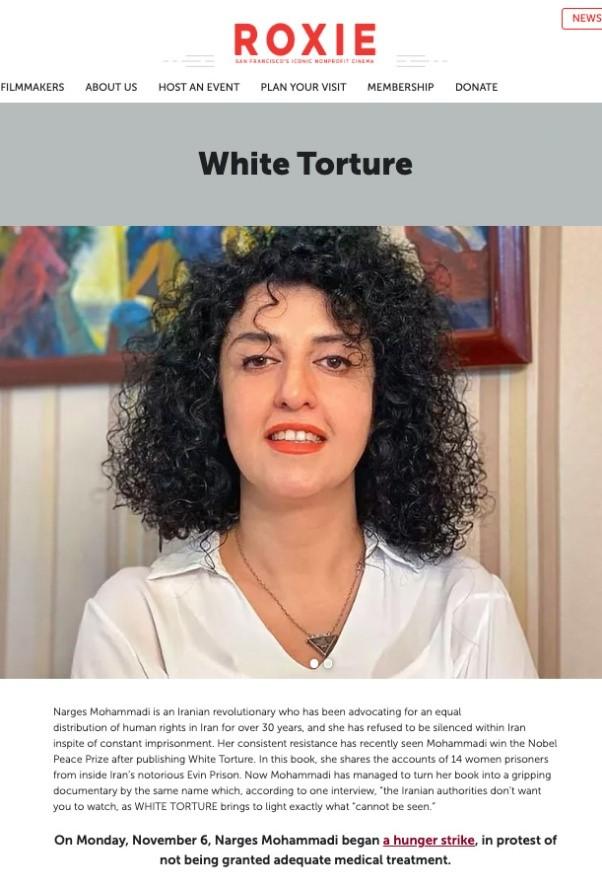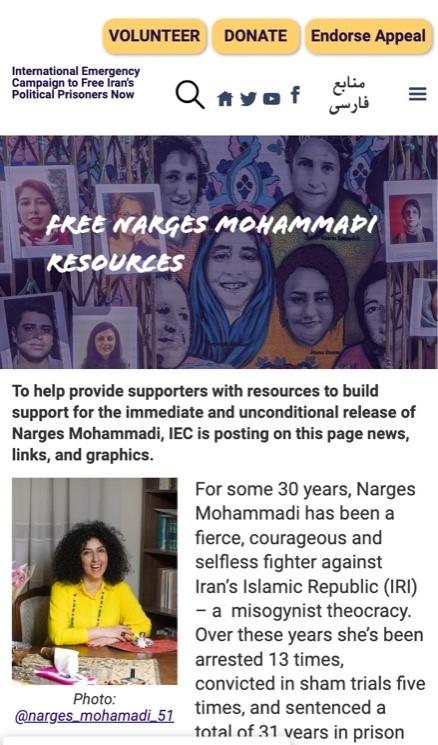With Gaza on our minds, about 40 of us recently gathered in the historic Roxie art theater of San Francisco’s Mission District. It was the first U.S. screening of the documentary White Torture, based on the same-titled book by Narges Mohammadi, the world-renowned Iranian political prisoner and courageous resister who just and justly won the 2023 Nobel Peace Prize.

Screenshot from Roxie.com
College students from the Bay Area—new people, doing new things—took initiative and organized this screening to bring Narges and Iran’s political prisoners to a broader audience. They made all the arrangements, including securing funding. It was a very powerful and heavy experience to see the up close and personal testimonies of the victims of white torture—protracted solitary confinement, and other horrific abuses aimed at crushing women’s bodies and spirits. Narges and those who risked appearing in her book and the film testify to the spirit of people determined to be liberated.
A Fitting Intro
When the big screen lit up, the image and voice of another beloved and brave voice, notably with a kaffiyeh over her shoulders, provided the political framework to the film:
I am Somayeh Kargar, activist in Osyan journal and collective, and former political prisoner in Iran. We're here tonight to show our opposition to prison, torture and the systematic apparatus of suppression, and also declare our solidarity and our alliance with freedom fighter prisoners. This is a necessity brought to us because of the nature of the governments, and because of our common struggle as the people of the world … and especially you, the people here in the U.S.—are not impartial observers. All of us have common interests in eliminating this system and eradicating the cycle of repression, execution and imprisonment. As someone who has experienced imprisonment, white torture, solitary confinement, interrogation and government pressure, I'd like to tell you not to underestimate your struggle and your protest movements…. The prisoners are under harshest pressure to either surrender or be isolated. But they resist, hold up their heads, and say No! Our responsibility is to not forget about them. We should be their voice and show in any form possible that we are alongside them. When I was in Gharchak Prison, I heard that a statement was written for the freedom of political prisoners, and in it people like Ariel Dorfman was a signatory. To see this, and hear about such news, was so inspiring and heartwarming. Yes! We are the people of the world, and we create our own justice seeking movement.
This was a fitting intro to a film that has won an award at the International Film Festival and Forum on Human Rights. The audience—a mix of Iranians, including some students, folks from San Francisco’s art scene, a professor and some older activists—was riveted by interviews with Narges herself, and several other women and men, all prisoners of conscience persecuted by Iran’s reactionary fundamentalist Islamic regime, and outraged at how solitary confinement, beatings, sensory deprivation and isolation, cruel interrogations by male perverts and sadists, denial of lifesaving medical treatments and worse had been inflicted on them. Some in the audience were familiar with how these methods are used worldwide, including by the U.S. government against its own political prisoners or in sites it sets up worldwide such as at Abu Ghraib in Iraq or at Guantánamo in Cuba.
A Dangerously Appropriate Moment
The interviews were conducted with former prisoners while Mohammadi was briefly on medical leave. Currently, she is back in Evin Prison—for the 12th time— where she faces ten years for standing up against an oppressive regime that claims the mantle of leading the “axis of resistance” against U.S. imperialism. Iran’s misogynistic ruling mullahs are punishing Narges for the publication of her book, White Torture, and this film with dizzying pile-on charges of “propaganda against the system,” “defamation,” and “rebellion against the prison authority.” She had been on hunger strike with other women in Evin to protest the denial of critical medical care for herself and other prisoners, and against forced hijab/headscarf. The regime had withheld medical treatment for her heart condition because she refused to wear a hijab. Ultimately, they allowed her to go to hospital for an angiography to identify blocked arteries in her heart. This was only after she issued a statement that she would not submit to the forced hijab “…even at the cost of my life … I will resist ‘forced hijab’ not just in words but in action, as Mahsa, Nika, Ghazaleh, Sarina, and Armita did, and paid with their lives.” It seems the regime may not want her death on their hands right now, when they are pretending to care about the people of Gaza.
As Somayeh’s video continued to make the case that
The problem of prisons and political prisoners is actually the problem of the state and political power which needs to suppress [people]. The global capitalist states are compelled to generate and regenerate oppression and exploitation in various forms, and prevent people’s struggle and the resistance against these conditions—or to steer resistance and struggle in a direction that cannot achieve the level of a revolutionary transformation. Every freedom fighting and justice seeking action should reveal the roots of crime against humanity, which is in the imperialist system of oppression and exploitation. In Iran, we're struggling against the two reactionary forces of religious fundamentalism and capitalism-imperialism which are the cause of the daily pain and suffering of our people…. Our struggle in Iran is not separate from the struggle to end the genocide of the people in Palestine, the destruction of the lives of the people in Ukraine, the endless pain and suffering of the people of Afghanistan, from lifting the shadow of death from the lives of the Black people, from the emancipation of women and of different sexual and gender orientations. It is not separate from the overall emancipation of humanity.
Call for Iranians to Stand with Gaza
A brief video statement after the film ended came from Mariam Claren, the daughter of political prisoner Nahid Taghavi, a German-Iranian who has been arbitrarily imprisoned in Iran’s Evin Prison since October 2020, including over seven months in solitary confinement. She linked the struggle to free Narges and Nahid and all of Iran’s political prisoners with the struggle for liberation of the people of the world, including the Palestinian people now undergoing genocide in Gaza.
In Germany right now, pro-Palestinian protests are banned. This underscores the significance of Mariam Claren’s and Somayeh Kargar’s calls to stand with the Palestinian people and against U.S.-backed Israeli genocide on Gaza. Along with the statement by Narges calling for a ceasefire, these calls must be supported and spread with urgency as part of fighting for Iran’s political prisoners as part of “proceeding from the interest of the people of the world” against the various oppressive governments—be it Iran or the U.S./Israel.
Postscript from IEC Organizers
IEC organizers held a follow-up Zoom meeting shortly after this event with some of the attendees. We learned that because Iran’s Islamic fundamentalist regime supports Hamas and its regional ambitions cause it to clash with Israel, too many Iranians inside and outside Iran who hate that regime are passively and even actively supporting Israel. We heard about fascist-Zionists and pro-U.S. fascist-monarchists (those aligned with “Prince” Reza Pahlavi, who visited Israel last summer) viciously attacking some Iranians in the Diaspora who take a stand with Palestinians, including by making death threats on social media. This is part of the larger, high-stakes struggle over what kind of world we want to live in and what kind of people we are going to be. Those who want to be part of this righteous struggle to free Iran’s political prisoners should volunteer with the IEC now.
